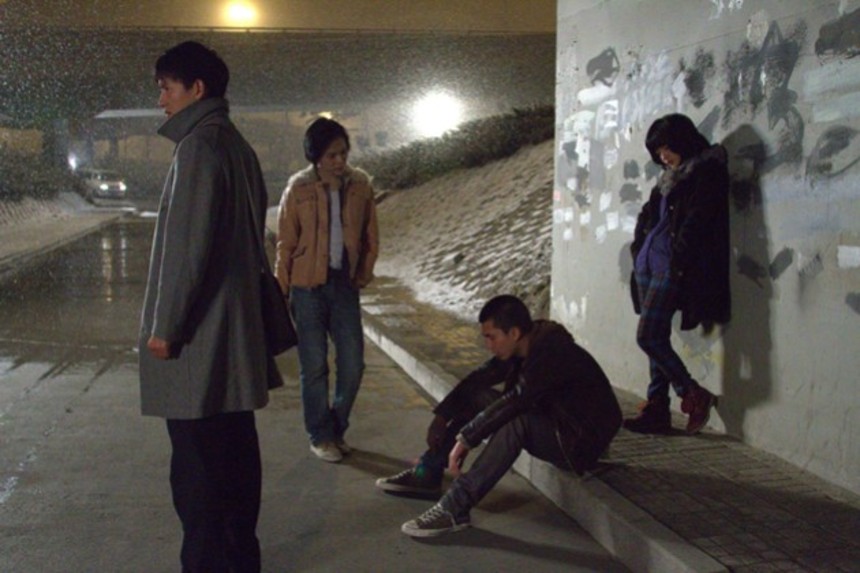Global Lens 2013 Review: BEIJING FLICKERS, A Subtly Observed, Incisive Portrait of China's Struggling Youth

San Bao (Duan Bowen), the disaffected, down-and-out protagonist of Zhang Yuan's latest and beautifully observed film Beijing Flickers, in an early scene, is desperately chasing after his dog Lucky, "meaning Happiness," who has suddenly run away. It soon becomes clear that the idea that luck and happiness has left San Bao refers to much more than the fact of his canine companion abandoning him. The mean streets of Beijing have not been kind to San Bao: in short order, he loses his dead-end assembly-line job, his girlfriend Chengcheng (Xiao Yuyu) to a rich (and married) man, and will soon be homeless due to his run-down digs being slated for demolition. Making San Bao feel like even more of a loser is his unsuccessful attempt to end it all by trying to put himself in the path of a train; he miscalculates and stands on the wrong track.
Well beyond the end of his tether, after relating the sob story of his lost dog to a female bartender, San Bao impulsively eats the glass he has been drinking from, landing him in the hospital. This act badly lacerates his mouth, rendering him mute for most of the film (his thoughts are related intermittently to us through voiceover). However, it is unclear whether San Bao's muteness is entirely due to his injury, or a willful act on his part representing the fact that he has been rendered voiceless in societal terms due to his poverty and lack of success in life.
Through San Bao's mute travels and interactions with others, we are introduced to some other members of Beijing's youthful economic demimonde that figure in this story. San Bao's best friend Wang Min (Lv Yulai) works as a hired driver of expensive cars for the upper classes, and just like San Bao, also suffers with a girlfriend who is also seeking greener pastures with a richer man. San Bao's self-inflicted wounds have put him in contact with two new companions: Xiao Shi (Shi Shi), his hospital roommate who is a plastic surgery enthusiast, amateur poet, and drag queen performer; and You Zi (the very striking Li Xinyun), a young female singer who fronts the band playing at the bar where San Bao drowned his sorrows. You Zi also later falls victim to the brutal calculus of companions (in her case, bandmates), who are ready to abandon long-standing personal relationships in the pursuit of cold, hard cash.
What binds all these characters together, as well as others including Su Mo (Han Wenwen), You Zi's roommate who is being sexually exploited by her corporate boss, is an affecting, somewhat romanticized, but nevertheless bitingly incisive portrait of modern-day China's rapid economic progress. Represented by the titular capital city, great riches have been promised, or at the very least tantalizingly held in front of, a class of youth who are being increasingly left behind in the wake of the country's growing wealth.
Director Zhang Yuan, returning to the youthful milieu of his 1993 film Beijing Bastards, paints an indelible portrait of a society that, while having improved the lives of many, has left just as many behind, and without the safety nets that will prevent them from sinking into an ever-descending spiral of poverty, joblessness, homelessness, and never-ending struggle. Beijing Flickers grew out of a commissioned photography project, as well as extensive interviews with Beijingers in their 20s and 30s, in which Zhang made portraits of some of these young people, putting a face and giving a voice to those who are often faceless and voiceless to a society and government that often fail to acknowledge the problems suffered by its citizens. Zhang, in the film incarnation of this project, provides a vivid visual backdrop to the stories he tells here, with run-down tenements, dive bars, and construction rubble sitting cheek-by-jowl with ostentatious displays of conspicuous consumption - expensive cars, expensive booze consumed at karaoke bars. Zhang rejects the aridly austere arthouse clichés of some of his fellow Chinese filmmakers in favor of a warmer, much more accessible style that nevertheless brings his urgent messages home with undiluted force. And in these tough economic times, despite the language spoken here and other cultural details, viewers of Beijing Flickers will find much that feels all too familiar, regardless of where in the world they happen to live.
Beijing Flickers is currently screening for a week-long run, through January 16, at the Museum of Modern Art, as part of the usually consistently excellent "Global Lens" series, which this year runs until January 26. For more information on this film and others in the series, visit MoMA's website.

Do you feel this content is inappropriate or infringes upon your rights? Click here to report it, or see our DMCA policy.





